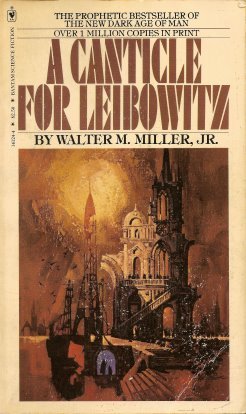Stephen reviewed A Canticle for Leibowitz by Walter M. Miller Jr.
Three interesting post-apocalyptic stories
5 stars
I originally read this just before Anathem was released as Neal Stephenson's book was going to have a similar idea. Which is sort of true, and sort of not. It's set in three eras after a nuclear war in the 1960s, the first in a barely-subsistence age, secondly in a medieval time, and thirdly with a tech level greater than our own..but still with nuclear weapons and tension.
The focus point of all three is the abbey, and none of the stories are cheerful. Re-reading it, the third one was a particularly hard read. The monks are Catholic and the third story deals a lot with the ethics of euthanasia. Speaking of Catholicism, there's more Latin in the book than you might originally expect.
The moral of the book is as unsurprising as it is heavy.
I originally read this just before Anathem was released as Neal Stephenson's book was going to have a similar idea. Which is sort of true, and sort of not. It's set in three eras after a nuclear war in the 1960s, the first in a barely-subsistence age, secondly in a medieval time, and thirdly with a tech level greater than our own..but still with nuclear weapons and tension.
The focus point of all three is the abbey, and none of the stories are cheerful. Re-reading it, the third one was a particularly hard read. The monks are Catholic and the third story deals a lot with the ethics of euthanasia. Speaking of Catholicism, there's more Latin in the book than you might originally expect.
The moral of the book is as unsurprising as it is heavy.


